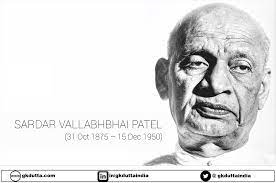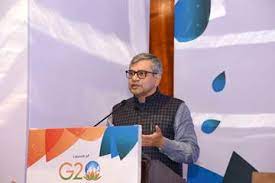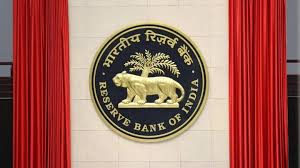
Nation Pays Tribute to Sardar Vallabhbhai Patel on His Death Anniversary: On the 71st anniversary of his passing, Prime Minister Narendra Modi and a number of Union Ministers paid tribute to Sardar Vallabhbhai Patel. Stating that the country will forever be grateful to Patel, PM Modi said, “Remembering Sardar Patel on his Punya Tithi. India will always be grateful to him for his monumental service, his administrative skills, and the untiring efforts to unite our nation.”
December 2022 Current Affairs Quiz
About The Towering Personality Of Sardar Patel:
Indian nationalist Vallabhbhai Jhaverbhai Patel was known as Sardar. He served as India’s first deputy prime minister from 1947 until 1950. He was a barrister and a prominent leader of the Indian National Congress who led the country’s independence movement and guided its integration into a single, independent nation. He was a member of the Indian National Congress’s conservative wing.
The “Iron Man of India,” Sardar Vallabhbhai Patel, was born on October 31, 1875, in the village of Nadiad in present Gujarat. In India’s freedom struggle, he was a political and freedom leader.
He is known as the Iron Man of India because of his strong views on the union of princely states into one nation, his good attitude toward women’s emancipation, and his active participation in shaping India into what it is now. Vallabhbhai Patel was given the title of ‘Sardar’ by Mahatma Gandhi.
In 1991, he received the Bharat Ratna posthumously. His birthday has been commemorated as Rashtriya Ekta Diwas since 2014. (National Unity Day). Sardar Vallabhbhai Patel joined the princely kingdoms in British Indian territory, preventing India from becoming divided. Due to his role in uniting the shards of princely kingdoms into a single nation, he is known as the ‘Bismarck of India.’
Modern All India Services was founded by him. He served as India’s first Home Minister and Deputy Prime Minister. Sardar Patel, 75, died of a major heart attack in Bombay on December 15, 1950.
Integration of Princely States:
Sardar Patel, India’s first Home Minister and Deputy Prime Minister, was instrumental in the union of 565 princely kingdoms into the Indian Union. Among the princely states that refused joining India were Travancore, Hyderabad, Junagadh, Bhopal, and Kashmir. Sardar Patel worked relentlessly to reach an agreement with the princely kingdoms, but he did not shy away from using Sama, Dama, Dand, and Bhed techniques when necessary. He had used force to acquire the princely realms of Junagadh, governed by the Nawab, and Hyderabad, ruled by the Nizam, both of whom had refused to join the Union of India.





